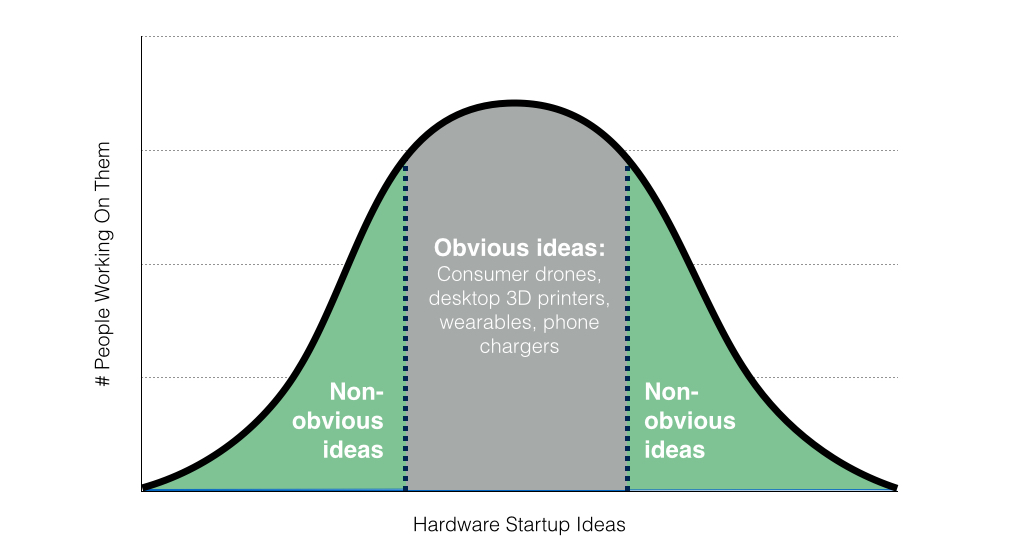
About once a day we get a pitch related to cell phone charging, drones, 3D printing, or robots that teach kids how to code. This is probably because people tend to start companies around problems they’re comfortable with. People see media hype as validation that these are good problems to work on. Sometimes they’re right, but just because a problem is widely talked about and somewhat painful doesn’t mean it’s a good place to start a business. We all need to eat and lots of people hate cooking, but starting a restaurant isn’t a good way to make money. Competitive markets destroy profits.

Commoditized Problem Spaces
If you work on problems you personally understand, there’s a higher likelihood of building something people actually want. However, average startup teams focusing on average problems should expect the average outcome: going out of business.
If you’re in the younger startup demographic (recently out of college without years of industry experience) do you really have unique insight or is it just superiority bias? Are you working on a problem that others don’t see, or are you just seeing the problem for the first time?
The Startups We Dream About
Like most investors, we’re primarily looking for great teams working in markets that are a good fit with the VC model, but there are a few areas we feel are underrepresented in the hardware startup space. Our hope is that founders already working in these areas reach out. We would love to see more founders working on:
- Enterprise/B2B connected devices
About half the companies we’ve funded have been enterprise focused, but only 1 in 5 of the pitches we see are B2B. We would love to talk to more entrepreneurs thinking about enterprise problems, particularly if they’re software services enabled by connected devices (Like our portfolio companies Ubiq, DipJar, or Squadle). - Disruption of distribution systems
Conventional hardware distribution really sucks. As more companies are figuring out how to go direct, we’re interested in how connectivity enables an ongoing relationship with consumers. Our investments in Kuvee, Sutro, and Petnet are along these lines. - Industries most tech founders don’t have experience in
We love talking to founders from unsexy industries like construction, agriculture, or oil and gas. Cheap sensors and connectivity is allowing software to go places it was previously hard for it to go before (like Concrete Sensors). - New sensors
Lots of entrepreneurs we talk to don’t understand the limitations of off-the-shelf sensor technology. We’re very interested in teams working on new kinds of sensors or novel ways of collecting data using the fusion of existing cheap sensors. - New ways to interface with digital media
Some of the biggest tech companies today are built on content discovery. Hardware has a role to play here too. Two of our portfolio companies (Qleek and Meural) are working on reducing the friction to consuming great content. We’d love to talk with others. - Virtual reality video capture
VR is going to fundamentally change how we think about many types of media consumption. No products currently exist that allow you to easily capture and distribute great VR-ready video. This might not be a space that’s easy for a small startup to compete in, but we haven’t seen anything compelling from the big companies yet either. - Augmented reality for the enterprise
When most people hear the words augmented reality they think google glass. AR is incredibly exciting, but it’s also a difficult problem that’s going to take a long time to figure out. In the near term we’re more excited about non-headmounted AR focused on the enterprise like Proglove. - Consumerized healthcare devices
Some companies are trying to invent new health product categories (Interaxon, Thync) while others are focused on packing sensors into devices that people already habitually use (OneDrop, Kinsa). Both are interesting spaces to be in, although we’re most interested in the latter. - Closing the gap between design and production
Getting from prototype through production today is still very manual and painful. We love services that make this process easier (like our portfolio company Tempo Automation or Plethora).
And if you’re NOT working in any of the categories you should reach out anyway! Upload a pitch at www.bolt.io/pitch and we’ll reply back, usually within the day.
Bolt invests at the intersection of the digital and physical world.